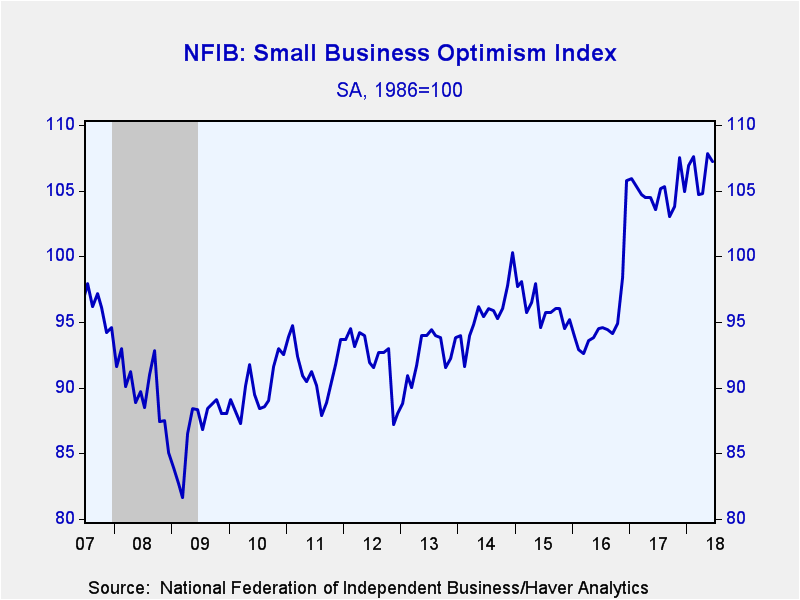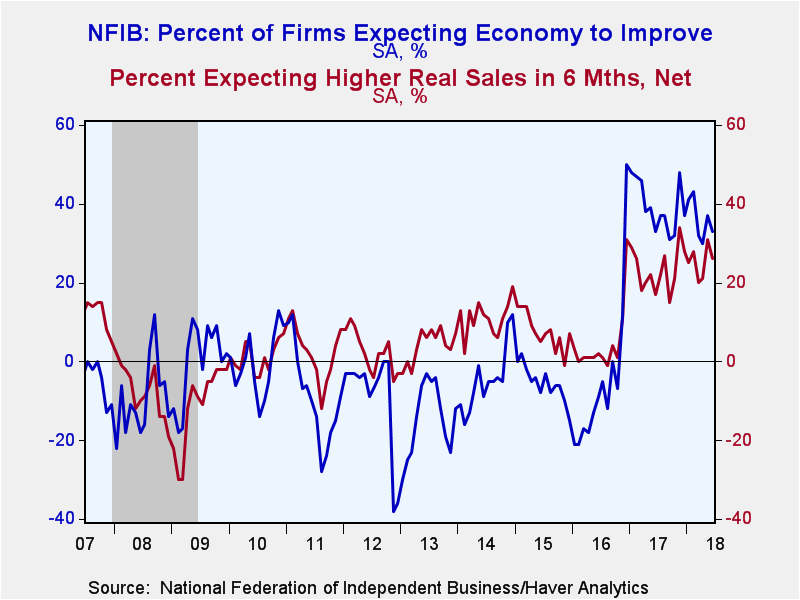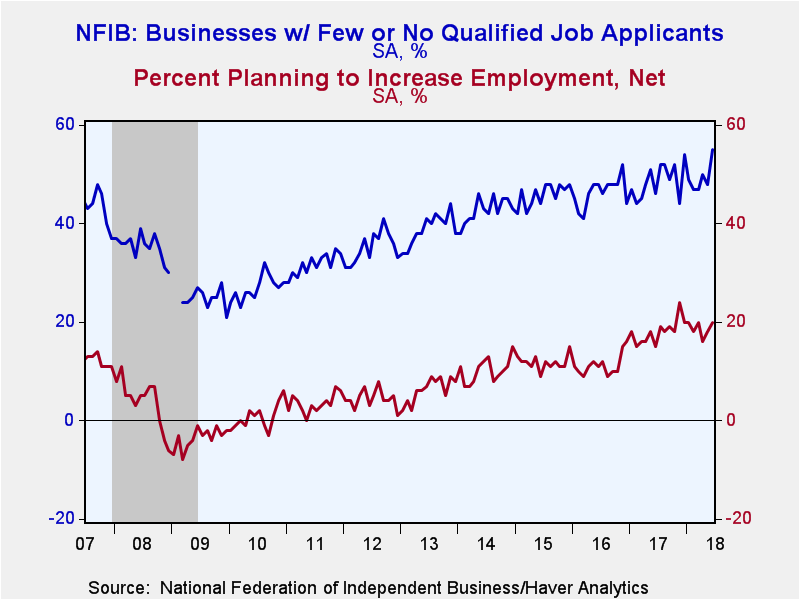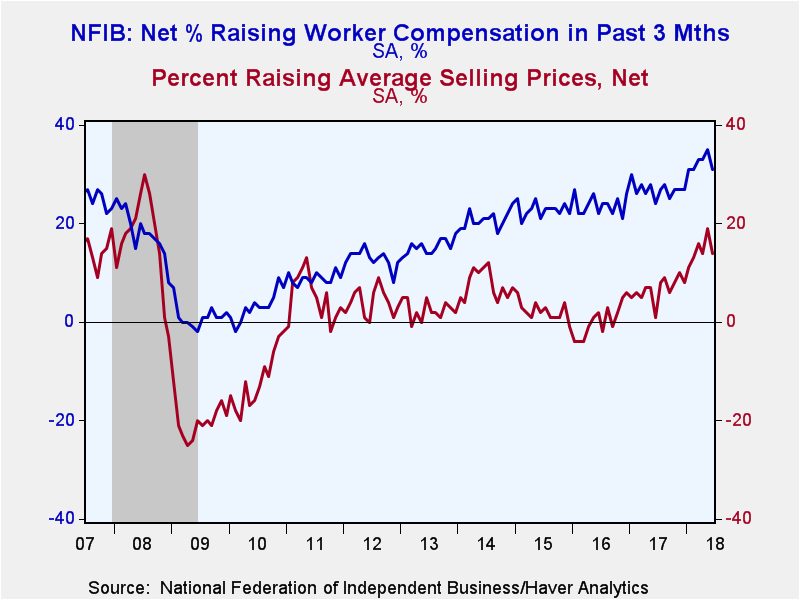 Global| Jul 10 2018
Global| Jul 10 2018U.S. Small Business Optimism Slips
by:Tom Moeller
|in:Economy in Brief
Summary
The National Federation of Independent Business (NFIB) indicated that its Small Business Optimism Index eased to 107.2 during June from 107.8 in May. It remained up sharply from the recent low of 92.6 in March 2016. A lessened 29% of [...]
The National Federation of Independent Business (NFIB) indicated that its Small Business Optimism Index eased to 107.2 during June from 107.8 in May. It remained up sharply from the recent low of 92.6 in March 2016.
A lessened 29% of firms indicated that now was a good time to expand the business. Thirty-three of firms expected the economy to improve, down from the December 2016 high of 50%. A lessened 26% of firms were expecting higher real sales, though that remained up versus 17% twelve months ago. A little-changed 29% of firms planned to make capital expenditures.
Labor market indicators showed strength. Twenty percent of businesses were planning to increase employment, up from 15% twelve months ago. Meanwhile, a record 55% indicated that there were few or no qualified candidates for job openings.
Pricing pressure remained strong. A net 14% of firms were raising average selling prices, down slightly m/m but up from one percent twelve months ago. A slightly lessened 24 percent of firms were planning to raise prices, but that remained near the ten-year high. A fewer 31% of firms increased worker compensation, and a weakened 21% of businesses were planning to raise compensation.
Credit was readily available. A greatly lessened two percent of businesses reported difficulties in obtaining credit, the lowest level of the economic expansion.
This survey inquires about problems facing small business. The most pressing problem in June continued to be labor quality at a high 21%, up from four percent in 2010. Six percent of firms reported the cost of labor as the most significant problem. Government requirements were worrisome to 14% of respondents, down from 22% in 2015. A lessened 14% indicated that taxes were the largest problem, down from a December 2014 high of 27%. Competition from large businesses fell sharply to 9%, and insurance costs/availability worried a slightly increased 11%. Poor sales remained at an expansion low of 8% while financial & interest rate problems (2%) remained negligible. Price inflation problems eased to two percent.
Roughly 24 million small businesses exist in the U.S. and they create 80% of all new jobs. The index is based 1986=100. The typical NFIB member employs 10 people and reports gross sales of about $500,000 a year.
The NFIB figures can be found in Haver's SURVEYS database.
| National Federation of Independent Business (SA, Net % of Firms) | Jun | May | Apr | Jun'17 | 2017 | 2016 | 2015 |
|---|---|---|---|---|---|---|---|
| Small Business Optimism Index (1986=100) | 107.2 | 107.8 | 104.8 | 103.6 | 104.9 | 95.3 | 96.1 |
| Firms Expecting Economy to Improve | 33 | 37 | 30 | 33 | 39 | -5 | -5 |
| Firms Expecting Higher Real Sales | 26 | 31 | 21 | 17 | 23 | 5 | 8 |
| Firms Reporting Now Is a Good Time to Expand the Business | 29 | 34 | 27 | 21 | 23 | 10 | 12 |
| Firms Planning to Increase Employment | 20 | 18 | 16 | 15 | 18 | 11 | 12 |
| Firms With Few or No Qualified Applicants for Job Openings (%) | 55 | 48 | 50 | 46 | 49 | 46 | 46 |
| Firms Reporting That Credit Was Harder to Get | 2 | 5 | 5 | 3 | 4 | 5 | 4 |
| Firms Raising Average Selling Prices | 14 | 19 | 14 | 1 | 7 | 0 | 2 |
| Firms Raising Worker Compensation | 31 | 35 | 33 | 24 | 27 | 24 | 23 |
Tom Moeller
AuthorMore in Author Profile »Prior to joining Haver Analytics in 2000, Mr. Moeller worked as the Economist at Chancellor Capital Management from 1985 to 1999. There, he developed comprehensive economic forecasts and interpreted economic data for equity and fixed income portfolio managers. Also at Chancellor, Mr. Moeller worked as an equity analyst and was responsible for researching and rating companies in the economically sensitive automobile and housing industries for investment in Chancellor’s equity portfolio. Prior to joining Chancellor, Mr. Moeller was an Economist at Citibank from 1979 to 1984. He also analyzed pricing behavior in the metals industry for the Council on Wage and Price Stability in Washington, D.C. In 1999, Mr. Moeller received the award for most accurate forecast from the Forecasters' Club of New York. From 1990 to 1992 he was President of the New York Association for Business Economists. Mr. Moeller earned an M.B.A. in Finance from Fordham University, where he graduated in 1987. He holds a Bachelor of Arts in Economics from George Washington University.
More Economy in Brief
 Global| Feb 05 2026
Global| Feb 05 2026Charts of the Week: Balanced Policy, Resilient Data and AI Narratives
by:Andrew Cates










